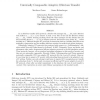Free Online Productivity Tools
i2Speak
i2Symbol
i2OCR
iTex2Img
iWeb2Print
iWeb2Shot
i2Type
iPdf2Split
iPdf2Merge
i2Bopomofo
i2Arabic
i2Style
i2Image
i2PDF
iLatex2Rtf
Sci2ools
ASIACRYPT
2008
Springer
2008
Springer
Universally Composable Adaptive Oblivious Transfer
In an oblivious transfer (OT) protocol, a Sender with messages M1, . . . , MN and a Receiver with indices 1, . . . , k [1, N] interact in such a way that at the end the Receiver obtains M1 , . . . , Mk without learning anything about the other messages and the Sender does not learn anything about 1, . . . , k. In an adaptive protocol, the Receiver may obtain Mi-1 before deciding on i. Efficient adaptive OT protocols are interesting both as a building block for secure multiparty computation and for enabling oblivious searches on medical and patent databases. Historically, adaptive OT protocols were analyzed with respect to a "half-simulation" definition which Naor and Pinkas showed to be flawed. In 2007, Camenisch, Neven, and shelat, and subsequent other works, demonstrated efficient adaptive protocols in the full-simulation model. These protocols, however, all use standard rewinding techniques in their proofs of security and thus are not universally composable. Recently, Pe...
Related Content
| Added | 12 Oct 2010 |
| Updated | 12 Oct 2010 |
| Type | Conference |
| Year | 2008 |
| Where | ASIACRYPT |
| Authors | Matthew Green, Susan Hohenberger |
Comments (0)

